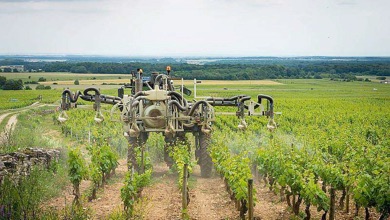News
5 August 2018
The use of pesticides still on the increase in France
It has been years since the French Government started to implement programmes aiming specifically to reduce pesticide consumption (e.g. the Écophyto plan launched in 2008, the campaign to produce differently and the plan to develop organic farming). The Government even published contested figures in 2013 that indicated a decrease in pesticide consumption [read in French].
This notwithstanding, pesticide uses is still on the increase in France. Data for 2016-1017 show a growth of 12.4% compared to 2009, while the objective of the Écophyto plan was to reduce the use of pesticides by 50% between 2008 and 2018. And it is quite useless to take comfort in the fact that things are worse elsewhere in the world [read].

The danger of pesticides for human health, the environment and biodiversity is now well established. The United Nations even acknowledged that the production and use of pesticides is an infringement on the rights to food and health [read]. In France, as early as 2013 the Inserm (French biomedical and human health research institute) had issued a warning on the risks linked to these highly toxic and carcinogenic products [read the synthesis of the report in French] and, recently, a parliamentary report prepared in the framework of the national food conference was quite devastating.
Tens, if not hundreds of millions of euros were spent in France without result. This shows clearly that measures implemented by the Government are not sufficient and that there is a need to create an environment - providing the incentives, informing, conducting appropriate research and extension - that would orient agricultural production towards technologies that would not require the use of pesticides.
Isolated measures, such as the banning of glyphosate and of neonicotinoids, even though appropriate, cannot alone be effective to reduce the use of pesticides. Such measures are often - unfortunately - used for communicating in order to reassure a population who is increasingly worried about the quality and safety of the food supplied by the food system. But their effect in environment that encourages a chemical and industrial agriculture can at best be minimal.
—————————————
To know more:
-
•France Nature Environnement, Pas de surprise : L’usage des pesticides continue d’augmenter en France, Communiqué de Presse, 2018 (in French only).
-
•Thomas, A., Pesticides en France. Un rapport accablant, mais peu d’ambition, Ouest-France, 2018 (in French only).
-
•Inserm, Pesticides - Effets sur la santé, Synthèse et recommandations, INSERM, 2013 (in French only).
Earlier articles on hungerexplained.org related to the topic:
-
•Production and use of pesticides: an infringement on the rights to food and health, 2017.
-
•To eat more fruits and vegetables is fine. But which ones? 2017.
-
•Food, Environment and Health, 2014/2017.
-
•Pesticides: utilisation en légère baisse en France, 2013 (in French only).
-
•The decrease in population of bees is a threat for our food, 2013.
Last update: August 2018
For your comments and reactions: hungerexpl@gmail.com




